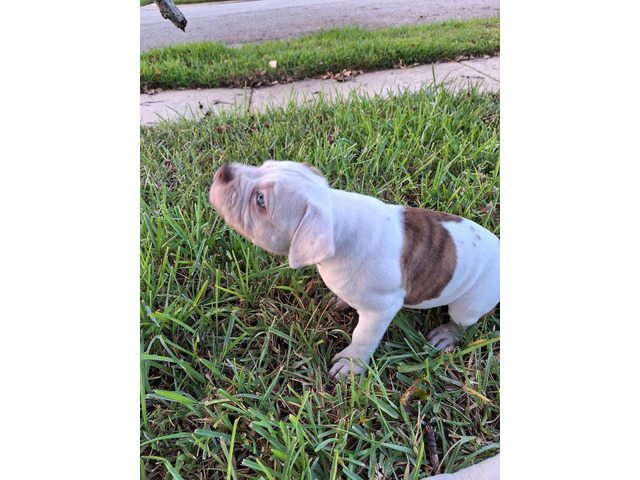Bulldog dog breed information
The English Bulldog is a well-known breed with a distinctive appearance and notable personality. Recognized for its muscular build, wrinkled face, and distinctive pushed-in nose, the English Bulldog has a rich history and continues to be a popular companion worldwide. This article covers the breed’s origins, physical characteristics, temperament, health issues, care requirements, and suitability for different homes.
Origins and History
The English Bulldog originated in England and was originally bred for bull-baiting, a sport that required a strong, tenacious dog. When bull-baiting was banned in the 19th century, the breed was refined to be a gentle companion rather than a sporting dog. Today, the English Bulldog is valued for its calm demeanor and loyalty.
Physical Characteristics
English Bulldogs are medium-sized dogs, typically weighing between 40 and 55 pounds. They have a stocky body, broad shoulders, and a large head. The face is characterized by loose skin and pronounced wrinkles, with a short muzzle and a distinctive underbite. The ears are small and folded.
- Size: 14–15 inches tall at the shoulder
- Weight: 40–55 pounds
- Coat: Short, smooth, and fine; colors include brindle, white, red, fawn, or a mix
- Tail: Short and straight or screwed
Temperament and Personality
English Bulldogs are known for their calm, gentle disposition. They are loyal to their families and generally get along well with children and other pets. Bulldogs tend to be easygoing, preferring a relaxed lifestyle. While they may show stubbornness at times, they are usually eager to please and respond well to positive reinforcement.
- Gentle and affectionate
- Stubborn but trainable
- Protective but rarely aggressive
- Good with children and other pets
- Low to moderate energy levels
Exercise and Activity
English Bulldogs do not require extensive exercise. Short daily walks and play sessions are sufficient to maintain their health. Excessive exertion should be avoided, especially in hot weather, as they are prone to overheating due to their short muzzle.
- Short walks (15–30 minutes)
- Indoor play sessions
- Monitor for signs of fatigue or overheating
Training Strategies
Bulldogs are intelligent but can be stubborn. Training should be consistent, patient, and based on positive reinforcement. Early socialization helps them become well-adjusted adults. Use treats, praise, and gentle guidance. Avoid harsh corrections.
- Start with basic commands
- Short, fun sessions work best
- Socialization with people and other animals is important
Grooming and Coat Care
The English Bulldog’s short coat is low-maintenance. Weekly brushing removes loose hair and keeps the skin healthy. Regular cleaning of facial wrinkles is necessary to prevent infections. Bathing should be done as needed with a gentle dog shampoo.
- Weekly brushing
- Clean facial wrinkles daily
- Regular nail trims
- Routine ear cleaning and dental care
Diet and Nutrition
Bulldogs benefit from a balanced diet formulated for medium-sized breeds. Divide food into two meals per day to prevent overeating and obesity, which is common in the breed. Monitor weight and adjust portions as needed. Fresh water should always be available.
Health Considerations
English Bulldogs are prone to certain health issues. Their short muzzle can cause breathing problems, especially in hot or humid conditions. Other common concerns include:
- Brachycephalic airway syndrome
- Hip dysplasia
- Skin infections
- Obesity
- Eye conditions
- Dental disease
- Heart problems
Routine veterinary checkups, vaccinations, and preventive care are essential. Owners should be prepared for higher veterinary costs due to the breed’s unique health challenges. Life expectancy for English Bulldogs is typically 8–12 years.
Living Arrangements and Suitability
English Bulldogs adapt well to a range of living environments, including apartments and houses. Their calm nature makes them suitable for families, singles, and seniors. Bulldogs thrive with owners who provide companionship, moderate exercise, and routine care.
- Families with children
- Singles or couples
- Seniors
- Apartment or house living
Bulldogs do not tolerate extreme temperatures well and should live indoors. They prefer routine and enjoy relaxing with their owners.
Travel and Adaptability
English Bulldogs can travel but require extra care, especially in hot weather. For trips, pack their usual food, water, leash, and familiar items. Avoid air travel when possible, as breathing issues may be worsened during flights.
Senior Bulldogs
As Bulldogs age, their energy levels drop, and they may need more frequent veterinary care. Provide soft bedding, joint supplements, and gentle activity. Monitor for signs of arthritis and keep up with regular health checks.
Frequently Asked Questions
- Are English Bulldogs good with children? Yes, they are gentle and tolerant.
- Do Bulldogs get along with other pets? Usually, especially when socialized early.
- How much exercise do Bulldogs need? Short daily walks and playtime.
- Are Bulldogs easy to train? They are intelligent but can be stubborn; patience and consistency are important.
- Do Bulldogs shed? Yes, lightly year-round.
- Are Bulldogs hypoallergenic? No.
- How long do Bulldogs live? Most live 8–12 years.
- Can Bulldogs be left alone? For short periods, yes, but they prefer company.
- Are Bulldogs good for first-time dog owners? Yes, if owners are prepared for their care needs.
Cost and Adoption
English Bulldog prices range from $1,500 to $4,000 depending on breeder reputation, location, and lineage. Adoption is an option, with Bulldogs and similar mixes available in shelters. Prospective owners should factor in ongoing costs for food, grooming, veterinary care, and training.
Community and Support
Bulldog owners can connect with breed clubs, online forums, and social media groups for advice and support. Participation in local dog events, training classes, and community activities helps Bulldogs socialize and remain engaged.
Conclusion
The English Bulldog is a loyal, gentle companion suited for a variety of households. With proper training, moderate exercise, and attention to health, Bulldogs offer years of companionship and comfort. Owners should be prepared for the breed’s unique care needs and health considerations, ensuring their Bulldog enjoys a safe and happy life.
